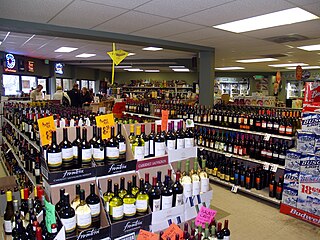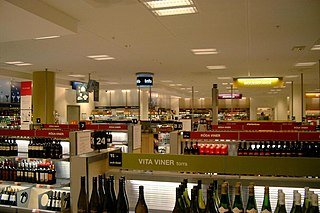
The Liquor Control Board of Ontario (LCBO) is a Crown agency that retails and distributes alcoholic beverages throughout the Canadian province of Ontario. It is accountable to the Legislative Assembly through the minister of finance. It was established in 1927 by the government of Premier George Howard Ferguson to sell liquor, wine, and beer. Such sales were banned outright in 1916 as part of prohibition in Canada. The creation of the LCBO marked an easing of the province's temperance regime. By September 2017, the LCBO was operating 651 liquor stores.
Scott Smith is a politician in Manitoba, Canada. He was a member of the Legislative Assembly of Manitoba as New Democratic Party from 1999 to 2007, and was a cabinet minister in the government of Gary Doer.

The Société des alcools du Québec is a provincial Crown corporation and monopoly in Quebec responsible for the trade of alcoholic beverages within the province.

A liquor store is a retail business that predominantly sells prepackaged alcoholic beverages, including liquors, wine or beer, usually intended to be consumed off the store's premises. Depending on region and local idiom, they may also be called an off-licence, off-sale, bottle shop, bottle store or, colloquially, bottle-o, liquor store or other similar terms. A very limited number of jurisdictions have an alcohol monopoly. In US states that are alcoholic beverage control (ABC) states, the term ABC store may be used.
The BC Liquor Distribution Branch (BCLDB) is the governmental body responsible for distributing alcohol and cannabis products in the province of British Columbia, Canada. The BCLDB operates under the Ministry of Finance and was established in 1921. The BCLDB head office is located in Burnaby, with distribution centres in Delta and Kamloops.
The Pennsylvania Liquor Control Board (PLCB) is the independent state government agency in Pennsylvania that manages the beverage alcohol industry in the state under the regulations of the Pennsylvania Liquor Code. The board is responsible for licensing the possession, sale, storage, transportation, importation, and manufacture of wine, spirits, malt or brewed beverages, and operating the state's system of liquor distribution, including retail sales, and providing education about harmful effects associated with underage and dangerous drinking.

Alcoholic beverage control states, generally called control states, less often ABC states, are 17 states in the United States that have state monopoly over the wholesaling or retailing of some or all categories of alcoholic beverages, such as beer, wine, and distilled spirits.

The Manitoba Lotteries Corporation (MLC) was a Crown corporation that controlled and operated gambling in the Canadian province of Manitoba. It managed two casinos in Winnipeg: McPhillips Station Casino and Club Regent Casino. MLC also operated video lottery terminals, and is responsible for the distribution of all lottery products to a network of retailers in the province. MLC was succeeded by the Manitoba Liquor & Lotteries Corporation in 2013.

The Alberta Gaming, Liquor and Cannabis Commission (AGLC) is an agency of the government of the Canadian province of Alberta, and regulates alcoholic beverages, recreational cannabis, and gaming-related activities. References to cannabis were added to AGLC's name and governing legislation as cannabis in Canada moved towards legalization in 2018. AGLC was created in 1996 as the Alberta Gaming and Liquor Commission by combining the responsibilities and operations of the Alberta Liquor Control Board (ALCB), Alberta Lotteries, the Alberta Gaming Commission, Alberta Lotteries and Gaming and the Gaming Control Branch. The current chief executive officer as of 2020 is Kandice Machado.
The Saskatchewan Liquor and Gaming Authority is a Treasury Board crown corporation responsible for the distribution, control and regulation of alcoholic beverages, cannabis and most gambling in the Canadian province of Saskatchewan. Its head office is located in Regina.
The Alcohol and Gaming Authority is an agency of the government of the Canadian province of Nova Scotia that regulates gambling and alcoholic beverages in the province.

A liquor license is a governmentally issued permit for businesses to sell, manufacture, store, or otherwise use alcoholic beverages.

The Nova Scotia Liquor Corporation (NSLC) is the Crown corporation which controls sales of alcoholic beverages and recreational cannabis in Nova Scotia, Canada. It is the sole distributor for these products and runs all retail outlets selling alcohol and cannabis products. The exceptions are for four private retailers in urban HRM offering beer, wine, and spirits, and, in rural areas where there is not an NSLC location, 65 "agency" liquor stores operated by private retailers on NSLC's behalf.

An alcohol monopoly is a government monopoly on manufacturing and/or retailing of some or all alcoholic beverages, such as beer, wine and spirits. It can be used as an alternative for total prohibition of alcohol. They exist in all Nordic countries except Denmark proper, and in all provinces and territories in Canada except Alberta. In the United States, there are some alcoholic beverage control states, where alcohol wholesale is controlled by a state government operation and retail sales are offered by either state or private retailers.
Crown corporations are government organizations in Canada with a mixture of commercial and public-policy objectives. They are directly and wholly owned by the Crown.
Canadian liquor plebiscites, held in 1920 under the Canada Temperance Act and the Dominion Elections Act, were referendums on the strengthening of the Prohibition measures in effect in several provinces of Canada. Voters were asked if they supported banning of importation of liquor across provincial boundaries. The referendums were held on July 10, 1920, in New Brunswick; on October 20 in British Columbia; and on October 25 in Alberta, Manitoba, Nova Scotia, and Saskatchewan.

The Manitoba Liquor & Lotteries Corporation is a crown agency of the Manitoba government responsible for providing legalized gambling ("gaming"), distributing and selling liquor, and for sourcing and distributing non-medical cannabis to retailers in the province of Manitoba.

On October 17, 2018, cannabis was legalized in Canada for recreational and medical purposes. It was already legal for medicinal purposes, under conditions outlined in the Marihuana for Medical Purposes Regulations issued by Health Canada, and for seed, grain, and fibre production under licence by Health Canada.

Non-medical cannabis in Manitoba became legal when the national Cannabis Act went into force on October 17, 2018.













